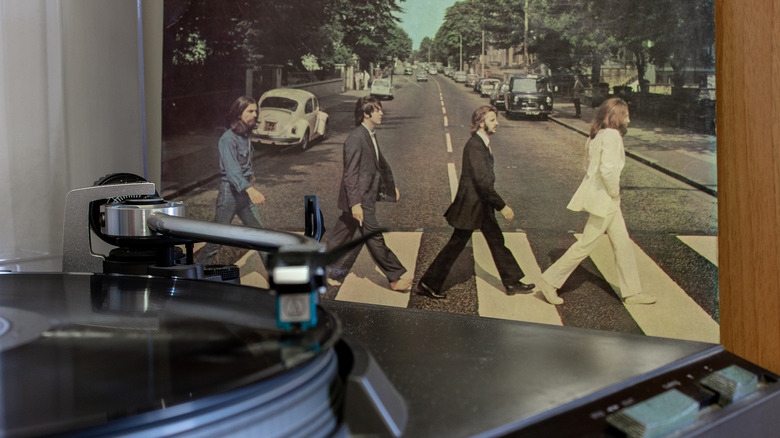When You Listen To Music, This Is What Happens To Your Brain
There's no doubt that music — from the soft and sublime to the hard and electric — clearly has a powerful effect on humans physically and emotionally. But what exactly does it do the brain?
You'd probably guess that the part of the brain activated by music is the part that processes sound, which is the temporal lobe or auditory cortex. You'd be right — but only partially. According to the University of Central Florida, there are 12 parts of the brain that engage when listening to or making music. These include the cerebellum, which controls movement while playing an instrument or clapping along to music; the amygdala, which processes emotions; the corpus callosum, which coordinates body movements; and the occipital lobe or visual cortex, which is engaged when reading music or assessing your own movements (via BrainFacts). Now, let's explore just what happens within the brain when you listen to your favorite tunes.
The rhythm will find you
Rhythm is integral for the brain in producing the coordination for walking and cadence for language. It is believed that because rhythm perception and production are required for motor activities and speech, both are present from birth. Humans can perceive rhythm through exposure to beat-based patterns, according to a report in Frontiers in Psychology.
The part of the brain responsible for perceiving rhythm is a collection of nerve bundles called the basal ganglia, located in the middle of the brain (per BrainFacts). It's connected to the premotor cortex and the cerebellum, which are the areas that control movement. It's believed that musical beat perception, even in a person who's still, involves signaling between auditory regions of the brain and motor-planning regions (via Frontiers in Systems Neuroscience). So whether or not you are tapping along, your brain is being stimulated in the areas responsible for movement.
Music, goosebumps, and brain benefits
Have you ever listened to a song and gotten goosebumps? Some unexpected parts of music, such as a crescendo, riff, or high note, trigger our sympathetic nervous system, fooling our brain into thinking there's danger (per BrainFacts). Evolution designed goosebumps to make our ancestors look bigger and more menacing against a rival or predator. That reflex still occurs, but within a split second, the brain realizes there's no danger and releases a flood of dopamine, a neurochemical that causes feelings of happiness and pleasure (via BrainFacts). It's the same process that happens when you're eating or having sex.
According to the University of Central Florida, music enhances the cognitive functions of the frontal lobe, which is used in thinking, decision-making, and planning. The hypothalamus, in addition to secreting dopamine, releases chemicals regulating metabolism, sex drive, growth, and other bodily functions. Music is believed to improve memory by boosting the production of new neurons in the hippocampus, which produces and retrieves memories.
The best kind of music for your brain
In 1993, a classic study found that listening to Mozart raised IQ scores and enhanced participants' spatial reasoning skills. This may be because the brain regions activated by listening to music and those used to complete spatial tasks overlap. However, it turns out that these results could not always be replicated. It may simply be that the best music for your brain is the kind you like.
"If you play someone's favorite music, different parts of the brain light up," neuroscientist Kiminobu Sugaya told the University of Central Florida. "That means memories associated with music are emotional memories, which never fade."
While listening to music you grew up with will have an emotional impact, experts suggest that listening to music on the top charts of today will provide a bigger brain boost, according to Johns Hopkins Medicine. New music presents a challenge for the brain, as it struggles to understand the unfamiliar sound. You may not like it at first, but trying it may enhance creativity.




